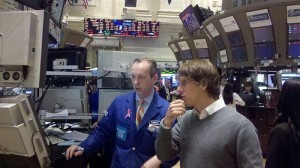There’s a whole lot of hubbub in the media about the outside world’s perceptions of America. There’s a narrative that Americans are portrayed as greedy, arrogant and nosey, and a great fuss is made over public opinion. It is true that all eyes are on America, but that is because we produce so much media and we broadcast our ideas all over the world. That opens the US up to a lot more criticism, but foreign policy is not a matter of popularity contests. For every Parisian who has a strong opinion about the American health care system, there are handfuls of people in the developing world that are taking a crack at success inspired by our free market capitalism and what they learn from our cultural output. Sometimes it doesn’t work out so well.
High Stakes Gamblers: Day Traders

There’s nothing playful about “playing the stock market.” Those bets placed are best educated bets, and the “game” is rigged to respond to real world events! No one should dare attempt to make a career out of trading on the stock market with only the resume of a card shark. However, our films and media which portray the sun-kissed, jet-setting trader, encourage the idea that the American Dream is to make money and do nothing. In 2004, a Nigerian man on trial for fleecing an elderly UK couple with a rarely effective email scam reportedly defended his actions by simply stating, “I wanted to get rich with computers like a powerful New York day trader.”
Cut Throats and Bootleggers
There’s a much more sinister scenario as well. The number of heinous crimes committed around the world by “Scarface” copycats alone is startling. From the streets of urban America to small cities in Swaziland, a news search will reveal countless “bad dudes” citing Scarface as their inspiration. We see the gruesome character immortalized on t-shirts and in hip hop tracks nearly 30 years after the film’s release. Despite the gore, it makes sense that the film would resonate with people around the world. It centers on a Cuban immigrant who gets wrapped up in an exciting and prosperous life upon coming to America, and it just kind of falls into his lap. The drawback is that this life is centered on crime, ruthlessness, and superlative thuggery to brutal excesses, and it transforms the “hero” from an optimistic person seeking a new life into a greedy monster. Those who look up to Pacino’s infamous character clearly overlook the tale’s moral.
What you put “out there” is what you get back, they say. The irony though, is that if you are American, you get it back in the form of bootlegged merchandise. Our markets are reportedly flooded with foreign-produced knock-offs of compromised quality. The same apparently goes for the criminals we inadvertently inspire.
Author bio: Jaclyn Young writes for several financial blogs. Learn to Trade at tradingacademy.com. Photo credit: “Check me out getting my Learn on at the NYSE this morning.” by Dennis Crowley